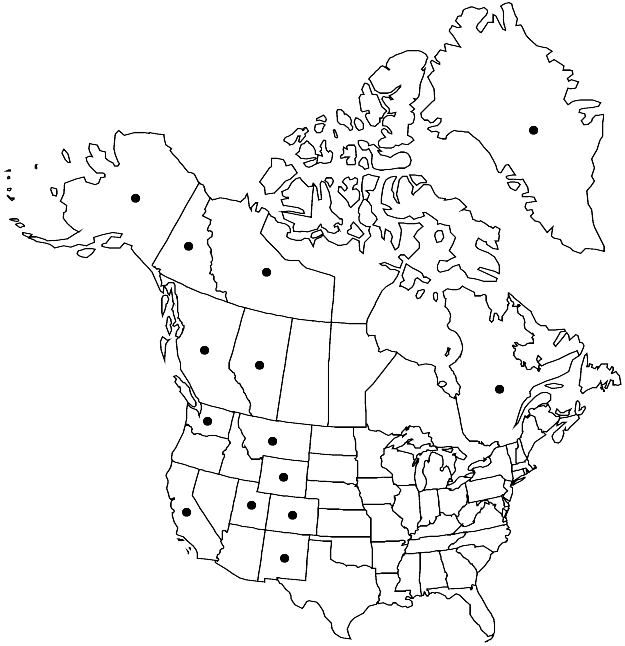Sciuro-hypnum latifolium
Arctoa 11: 270. 2003.
Plants medium-sized, occasionally large, in loose tufts, light green to yellowish. Stems to 3–6(–12) cm, creeping to ascending, straight or curved, terete-foliate, irregularly to regularly pinnate, branches to 8(–15) mm, straight to curved near apices, terete-foliate. Stem leaves appressed to erect, imbricate, ovate-triangular, concave, not or slightly plicate, 1.4–2.2 × 0.8–1.3 mm; base decurrent; margins plane, entire or minutely serrulate in acumen (especially at shoulders of acumen); apex gradually tapered or broadly rounded and then abruptly short and narrowly acuminate; costa (20–)50–70% leaf length, broad proximally, quickly narrowing at 10–20% leaf length, very narrow most of its length, terminal abaxial spine absent; alar cells 30–65 × 15–30(–35) µm, walls thin, region abruptly or gradually differentiated, pellucid; laminal cells elongate, (40–)70–140(–170) × 6–10 µm; basal juxtacostal cells short- or long-rectangular, slightly broader than laminal cells, region in 2 or 3 rows. Branch leaves similar, or in narrow branches much narrower; margins almost entire. Sexual condition dioicous. Seta reddish orange, 2–2.5 cm, rough. Capsule inclined, horizontal, or slightly pendent, orange-brown, ovate, curved dorsally, to 1.8 mm. Spores 13–16 µm.
Habitat: Rock, soil, wet, more or less open places, Arctic, alpine or northern boreal habitats, among other mosses, wet tundra, rich fens
Elevation: low to high elevations (0-3500 m)
Distribution

Greenland, Alta., B.C., N.W.T., Que., Yukon, Alaska, Calif., Colo., Mont., N.Mex., Utah, Wash., Wyo., n Europe, n Asia.
Discussion
Sciuro-hypnum latifolium is distinguished by medium-sized plants, 3–6 cm stems, pale color, and acute and strict distal leaves with more concave leaves in older parts of the stem, which are more or less rounded distally and often suddenly contracted to a short, narrow, usually reflexed acumen. The distal leaves are usually imbricate, but when growing among tall herbs in wet meadows and in minerotrophic fens, these leaves tend to be erectopatent. Other diagnostic characters for S. latifolium include subentire leaf margins, narrow laminal cells forming a dense areolation, and abruptly differentiated pellucid alar cells. The type of the synonym Brachythecium nelsonii was described from La Plata Mines, Wyoming. A. J. Grout (1928–1940, vol. 3) thought that S. nelsonii was related to B. rivulare and did not compare it with the S. glaciale group, where S. latifolium belongs. The latter position was suggested by E. Nyholm (1954–1969) and W. C. Steere (1978), and was recently confirmed by molecular phylogenetic analysis by S. Huttunen and M. S. Ignatov (2004). The leaf costae are occasionally double or almost absent (in individual leaves of plants with otherwise single costate leaves); the alar region often has a delimiting pit at the leaf border.
Selected References
None.